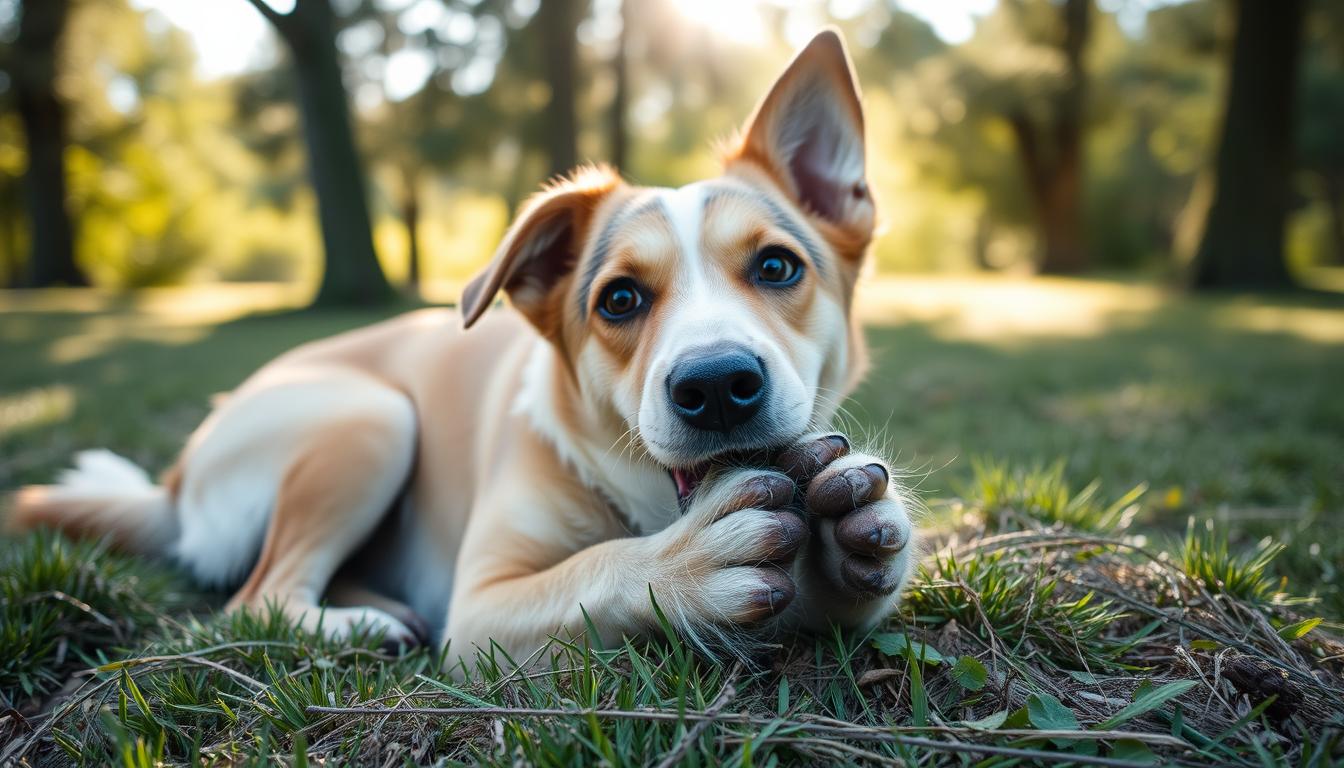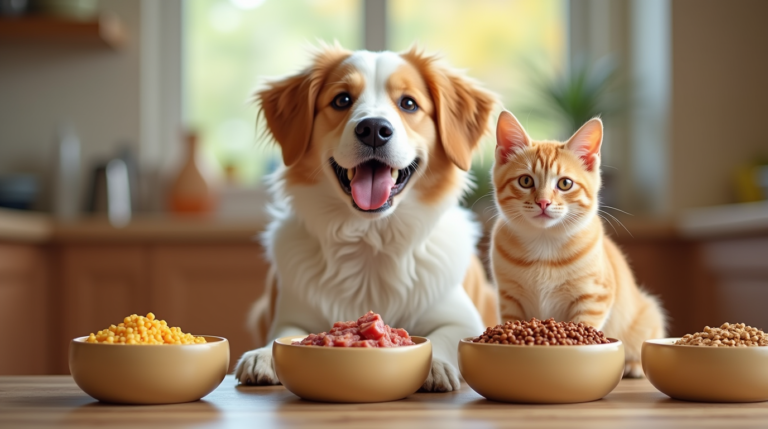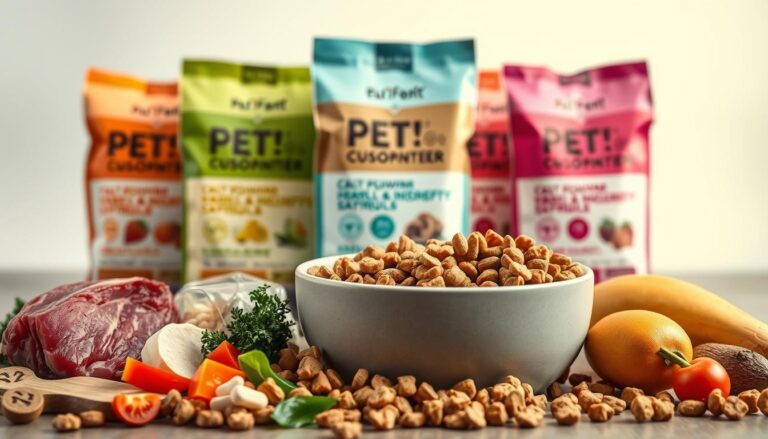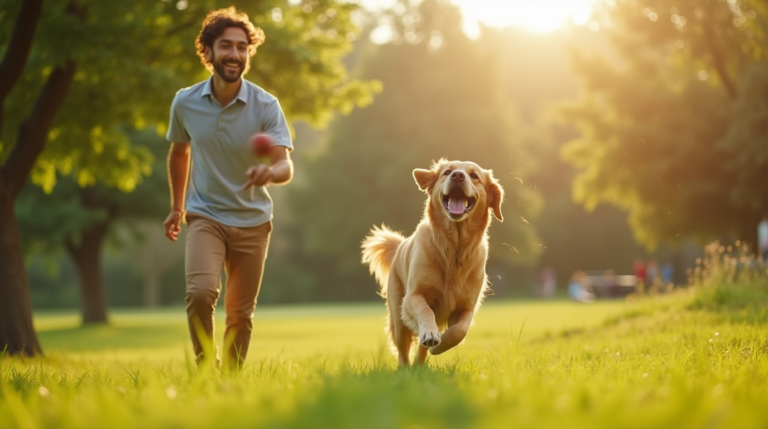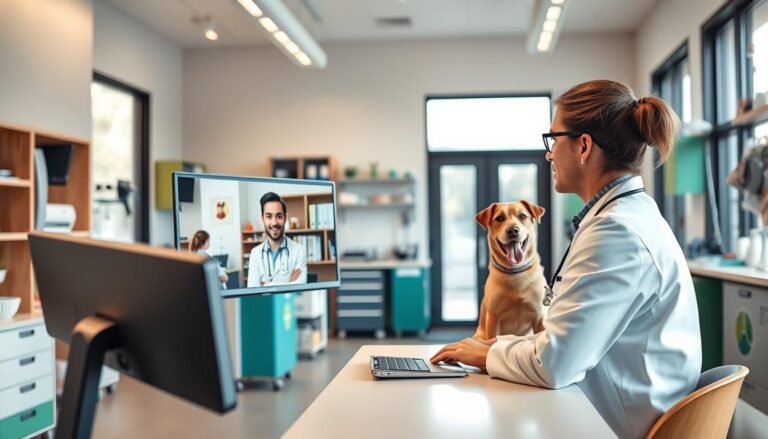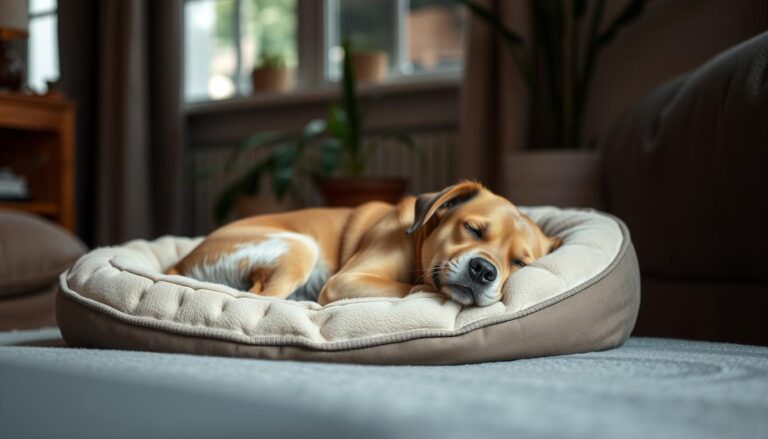Watching your dog lick and chew their paws can be heartbreaking. It’s a behavior that worries many pet owners. But, did you know that your dog’s gut might be the real cause? The link between gut health and paw chewing is both interesting and important for your dog’s health.
In this guide, we’ll explore why dogs chew their paws too much. We’ll focus on how gut health affects this behavior. By understanding this connection, you can help your dog feel better and live a healthier life.
Table of Contents
Common Reasons for Dog Paw Chewing
Dogs chew or lick their paws for many reasons. This includes pain, irritation, or injuries. Pododermatitis, an inflammation of the paw skin, can cause discomfort. Allergies and skin conditions like canine atopic dermatitis and food allergies also make paws itchy, leading to chewing.
Pain, Irritation, or Injuries
Paw injuries can make dogs chew their paws. Issues like sore spots, wounds, and nail bed infections are common. Dogs may also chew due to conditions like interdigital cysts or Sarcoptes scabiei mites, causing intense itchiness.
Allergies and Skin Conditions
Allergies are a big reason for paw chewing in dogs. Environmental allergies, or atopy, often start between 6 months and 3-4 years. Dogs with allergies may have pink or red skin between their pads.
Food allergies in dogs can also cause itching. Animal proteins are more likely to cause allergies than grains. Bacterial and fungal skin infections, like Malassezia yeast infections, can also cause symptoms like cheesy odor and flaky skin, making dogs chew their paws.
It’s important to find and treat the underlying cause. This helps the dog feel better and stops them from chewing their paws too much.
Gut Health and Paw Chewing Connection
Understanding the link between your dog’s gut health and paw chewing is key. An imbalanced gut microbiome, caused by diet, antibiotics, and more, can lead to inflammation and allergies. This can show up as skin problems, like allergic dermatitis and itchy paws, prompting your dog to chew.
Imbalanced Gut Microbiome
In healthy dogs, the gut is home to Bacteroidetes, Fusobacteria, and Firmicutes. Actinobacteria and Proteobacteria make up smaller parts. Diet, body weight, and age can change this balance. An imbalance, or gut dysbiosis, can cause inflammation, obesity, and mood issues in dogs.
Dietary Factors and Allergies
The gut and skin are closely linked, and an imbalanced gut microbiome can lead to allergies and skin problems in dogs. What your dog eats affects their gut microbiome and can trigger allergies. Changing their diet and adding supplements can help reduce paw chewing by addressing the cause.
| Trusted by 456,857 happy customers | 1 in every 3 dogs suffers from some kind of yeast issue | An astounding 84% of customers are seeing results after 7 days of daily use |
|---|---|---|
| The digestive blend contains billions of probiotics, inulin, honey powder, and FOS | Dogs smaller than 11 kg require 1 sachet of the digestive blend a day; dogs between 11-34 kg need 2 sachets a day; dogs over 34 kg will need 3 sachets a day | Fast free shipping for 2-3 business days |
| Suitable for all dogs over the age of 6 months | 14-day money-back guarantee | 50% discount on orders |
| 4,521+ five-star reviews | ||
By making dietary changes and using supplements, you can help your dog’s paw chewing. This approach can make your dog healthier and happier. It can also reduce skin problems and improve overall well-being.
Yeast Overgrowth and Paw Licking
If your dog is always chewing and licking their paws, yeast overgrowth might be the cause. Yeast infections, especially from Malassezia, are common in dogs. An imbalance in their gut can let yeasts like Candida albicans grow, causing skin problems.
Dogs with yeast overgrowth will lick and chew their paws a lot. This is because their paws are itchy and painful. Luckily, there are natural ways to fix this problem and balance their gut.
- Yeast infections in dogs are common, affecting pups of all ages.
- Certain breeds, such as Pit Bulls, Boxers, and Cocker Spaniels, are more prone to developing paw yeast infections.
- Yeast infections often arise secondary to other health conditions and won’t resolve without proper veterinary treatment.
- It can take weeks to months for a yeast infection to fully clear up, depending on the severity.
By changing their diet, using antifungal supplements, and other natural remedies, you can help your dog. This will stop the paw licking and prevent future problems.
“Chronic yeast infections in dogs may indicate an underlying issue that needs to be addressed.”
Diagnosing the Underlying Cause
When your dog keeps chewing on their paws, it’s key to work with a vet. They can find the real reason behind this behavior. A detailed veterinary examination and tests and diagnostic procedures help them figure it out.
Veterinary Examination
Your vet will start with a full physical check-up. They’ll look closely at your dog’s paws for any injuries, infections, or skin conditions. They might also check for pain or sensitivity by gently touching the paws. This helps them find clues about why your dog is chewing their paws.
Testing and Diagnosis
After the physical exam, your vet might suggest more tests and diagnostics. They could include:
- Skin scrapings to check for parasites or fungal infections
- Allergy testing to find out what’s causing the problem
- Cultures to see if there’s bacterial or yeast overgrowth
- Blood work to check for hormonal imbalances or other health issues
Finding the real reason for your dog’s paw chewing is crucial. It helps create a good treatment plan. By teaming up with your vet, you can solve the problem and help your dog feel better.
dog chewing paws gut health
Dietary Changes for Gut Health
Changing your dog’s diet can help with paw chewing. A high-quality, meat-based diet reduces inflammation and supports gut health. Avoid sugary or carb-rich foods to prevent yeast growth.
By making these diet changes, you can address the paw irritation’s root cause.
Supplements and Natural Remedies
Supplements can also aid in gut balance and paw relief. Probiotics, like Zesty Paws Probiotic Bites, replenish good bacteria and improve digestion. The dosage depends on your dog’s weight.
Natural anti-fungal treatments and gut-healing nutrients are also helpful. Ingredients like coconut oil, turmeric, and digestive enzymes combat yeast and support gut health. Combining diet changes and supplements offers a holistic solution.
“After using Zesty Paws Probiotic Bites for a month, our dog’s chronic digestive issues have significantly improved, and his coat is looking healthier than ever. We’re so pleased with the results!”
It’s crucial to consult with your vet to find the cause of paw chewing. A comprehensive plan addressing gut health can help your dog feel better and prevent more discomfort.
Environmental Factors and Paw Irritation
Environmental irritants can cause paw irritation and chewing in dogs. Exposure to harsh chemicals, like ice melt products or household cleaning products, can lead to skin problems. Even small objects like stones, sticks, or grass awns can cause discomfort and make dogs lick their paws more.
To protect your dog’s paws, keep them safe when outside and use safe products at home. Regularly check and clean your dog’s paws to prevent irritation from debris. By tackling these environmental issues, you can help your dog feel better and avoid more pain.
| Environmental Irritants | Potential Effects |
|---|---|
| Ice melt products | Can cause contact dermatitis and inflammation |
| Household cleaning products | Can cause contact dermatitis and inflammation |
| Small stones, sticks, or grass awns | Can get stuck between paw pads, leading to discomfort and excessive licking |
By addressing the environmental factors that may be causing paw irritation, you can provide your furry friend with much-needed relief and prevent further discomfort.

Keeping your dog’s paws protected when going outside and using pet-safe products around the home can help minimize environmental triggers.
Behavioral Issues and Compulsive Paw Licking
In some cases, a dog’s paw chewing is due to behavioral issues, not physical problems. Conditions like separation anxiety or boredom can make dogs lick their paws compulsively. This behavior can soothe them, but it also irritates their skin.
Dogs with compulsive disorders may lick their paws frantically. This behavior comes from emotional or mental health issues. Treating the root cause is key.
Getting help from a vet behaviorist or dog trainer is crucial. They can find what triggers the behavior and teach the dog new ways to cope. This includes changing the dog’s environment and adding more enrichment.
“Addressing the behavioral component is crucial for long-term management of compulsive paw licking in dogs,” says Dr. Sarah Wooten, a veterinary expert. “Without tackling the underlying emotional drivers, the behavior is likely to persist or even worsen over time.”
Understanding a dog’s mental health and paw health is important. With the right help, many dogs can stop licking their paws compulsively.
Prevention and Management Strategies
It’s important to stop dog paw chewing early. Check your dog’s paws often for signs of irritation, injury, or infection. If you find any, see your vet right away to avoid bigger problems.
Monitoring and Early Intervention
Get into the habit of examining your dog’s paws during grooming or play. Watch for redness, swelling, or cracked skin. If you see any early signs of dog paw problems, call your vet for help.
Enrichment and Training
Keep your dog’s mind and body busy with enrichment activities for dogs. Use training to reduce paw licking with positive rewards. This can help stop dog paw chewing.
Regular walks, playtime, and puzzle toys are great. They keep your dog’s mind and body active. This reduces the need for paw chewing.

“Keeping your dog’s mind and body active through enrichment and training is key to preventing paw chewing behaviors from developing in the first place.”
By focusing on your dog’s health and happiness, you can manage and prevent dog paw chewing issues. This way, you avoid long-term problems.
Conclusion
Dog paw chewing is a complex issue often linked to an imbalanced gut microbiome. Understanding the connection between digestive health, allergies, skin conditions, and compulsive behaviors is key. This knowledge helps pet owners tackle the problem effectively.
By making dietary changes, using supplements, managing the environment, and modifying behavior, you can solve paw chewing issues. This approach leads to a happier, healthier dog.
To improve your dog’s gut health and stop paw chewing, add probiotics, prebiotics, and anti-inflammatory supplements to their diet. Also, watch out for environmental triggers like harsh chemicals or irritants on their paws. With the right steps and ongoing care, you can solve your pet’s paw-licking problems for good.
By focusing on the link between dog paw chewing and gut health, you can help your pet overcome their struggles. Work with your vet to create a plan for your dog. Stay committed to their well-being for a happier, healthier pet.

